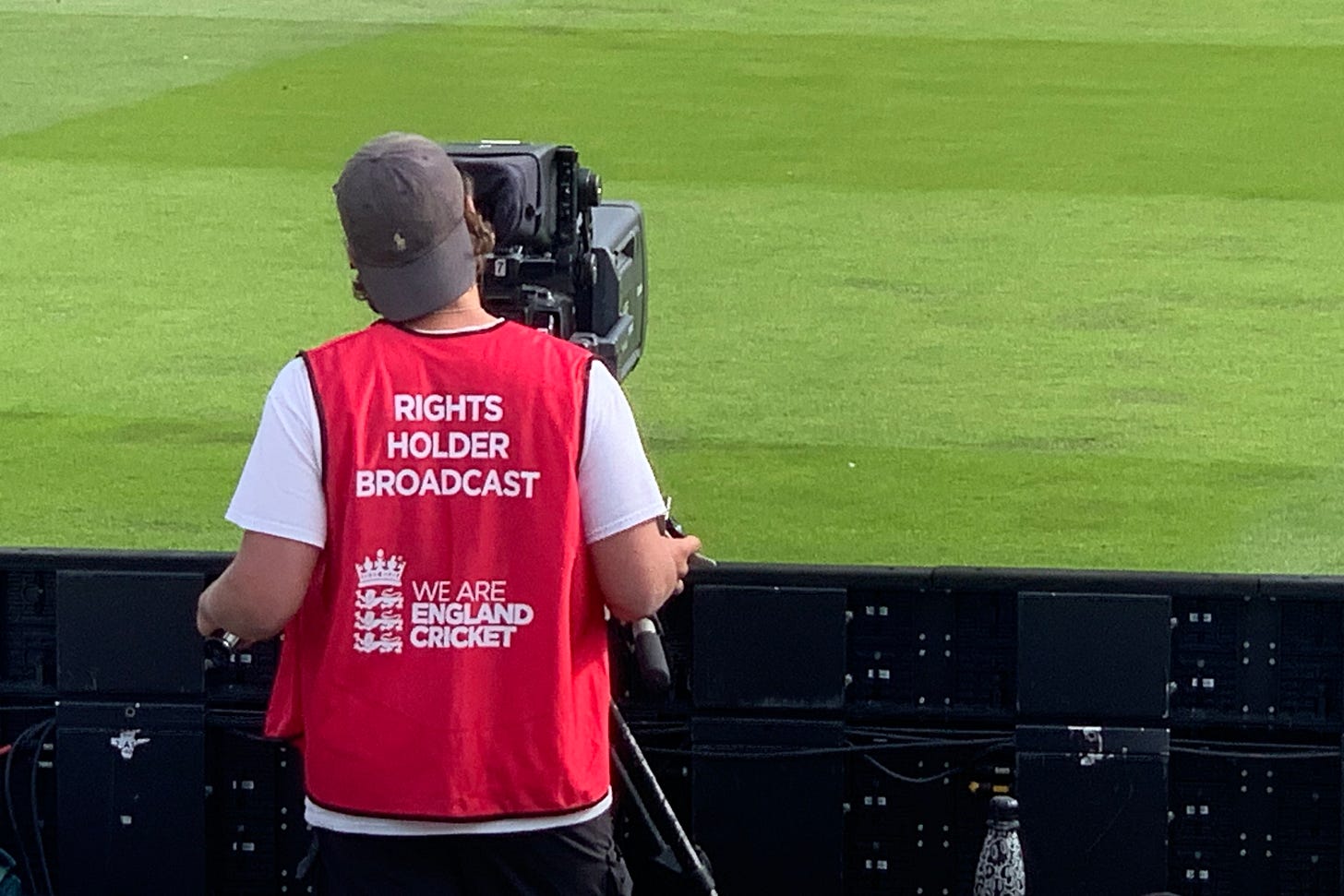Whether or not Rodri truly believes over-worked footballers are close to taking strike action, his comments have certainly had cut-through. Athlete strikes are not without precedent, in football and elsewhere. Think of the four strikes in the NFL’s history plus its owner lockouts, and Argentina’s football strike of 2017. Back in 2001, English footballers voted 2,290 to 22 to strike at televised matches in a dispute over TV revenues. In the end a deal was reached with the players’ union, the PFA, before any screens went blank.
It seems inconceivable that leading footballers might strike today, here or elsewhere in Europe, but refusing to take to the pitch isn’t the only weapon at their disposal. The PFA’s current CEO, Maheta Molango, has been vocal in warning of the effects on player welfare of the increasingly crowded football calendar. He must surely be contemplating ‘work-to-rule’ measures his members could adopt to put pressure on governing bodies and clubs that fall short of outright strikes.
"The fans are starting to see that this has an impact on what they are currently seeing on the pitch because the quality, frankly, has not been what it should be. As a fan, you’re thinking: ‘I pay 100 percent of my ticket, but I get 60 percent of the performance on the pitch’ – and that's not fair.” Maheta Molango
If I was Molango, my first recommendation to his membership would be to cease all media appearances and club sponsor duties. No more pre-match pressers or mixed zone sound bites. No more photo ops or press release quotes. Starves the media of colour pieces leaving it with nothing but match reports and speculation.
Next, refuse to travel overseas for any post- or pre-season friendlies. These may be lucrative for clubs but are a chore for players and coaches, and of dubious value in preparing for league competition.
If these don’t focus the minds of the paymasters, shift to the core of the matter - playing time. The PFA could call for a limit on matches or minutes for players. Say, 50 club games a season including friendlies, or 5,000 minutes if you prefer (to allow for substitute appearances and every game having a fair chunk of time added on). Perhaps that’s too high. Or not quite high enough. And how would international matches fit into the equation?
I’m sure the experts within the game could devise the number that best fits the fatigue facts. Squads these days are big, but their stars are over-used. If football needs all its competitions then playing time limits would force greater squad rotation. Surely a good thing for the PFA’s members.
All the above could be categorised as biting the hands that feed. Clubs would doubtless argue that lost revenue would ultimately put a squeeze on individuals’ wages. There would also be players chafing to play every minute of every game who resented playing time limits. Working to rule would test the boundaries of all parties’ ambitions and financial appetites. I can see little for the players to lose in taking the first small step and collectively falling silent.
Leaning on the lamppost
Impossible to escape the Riyadh Season publicity in central London in the days leading up to last Saturday’s Joshua-Dubois title fight at Wembley Stadium. Not just the extravagant Trafalgar Square weigh-in stage but the seemingly ubiquitous lamppost banners and football ground pitch-side LED screens.
Must have cost the event’s backers a small fortune by most sports promoters’ standards. Next time, if the Saudis truly want to publicise their Kingdom, how about paying Sky to broadcast the boxing free-to-air for all rather than charging £19.95 pay-per-view? Would multiply the eyeballs for only a few extra tens of millions of sportswashing dollars. And have a wider public humming along to the pre-fight rendition of the Saudi national anthem. Good value surely when you’re on a multi-year mission to win friends and influence people.
Game of Thrones
The auction has begun. The gavel is due to fall in early 2025. Put aside for now your personal views on The Hundred and reflect on what the sale of stakes in its team franchises might mean for the balance of power in English cricket. Seems to me that the ECB – whether by accident or design – has guaranteed itself a significantly diminished role within the game. No bad thing, some may say, but undeniably replete with risk.
No-one in business shells out tens or hundreds of millions of pounds in an early stage venture to be a sleeping partner. Few would part with significant amounts of cash for a minority stake. Early expressions of interest in The Hundred are said to have come from IPL owners, seasoned American investors in sport and heavyweight private equity firms. All will look at the parlous state of most first class counties and believe that they are better placed to generate a return from ownership of a franchise in The Hundred than the incumbent leaders. That may prove to be misplaced arrogance, but the putative buyers didn’t get where they are today by being short of ego.
On completion of the auction, the ECB will either have raised the gigantic sums that it has trailed and thereby ‘saved’ county cricket. Or it will have fallen embarrassingly short.
Media reports cite a series of criteria on which bids for franchises will be judged. We are told that money is not the overriding factor. Fine ideals at the start of the process, but let’s see how they stand up under pressure from bidders determined to secure overall control. It won’t be long before the ECB and the host counties, plus the MCC, realise that their list of requirements won’t square with maximising value from the auction.
Spool forward to next Spring and there may be as many as eight new power brokers in English cricket, although wealthy Surrey’s reluctance to cede control and possibly one or two other counties may limit the influx – at least on day one. These new arrivals will own the most important month in the English cricket calendar, August. There will be no international cricket to distract from their product. If they can collaborate effectively (by no means a guarantee, of course) they can then start to strangle the rest of the game.
It might seem outlandish to compare The Hundred with football’s Premier League, but there are parallels. The FA may be football’s governing body in England, but most would concur that the Premier League is the sport’s key player. It controls the most valuable brand and consequently holds sway over the rest of the professional game. The FA owns the England team and the most important cup competition, controls the annual calendar, regulates the game and is held responsible for the health of the grassroots. But the Premier League represents a massive hole in its portfolio and hence its power.
England’s cricket team is proportionally more important to the sport than the England football team is to its. And cricket accordingly milks its national team dry. For now, franchise cricket augments most England international careers rather than replacing them. But if The Hundred becomes dominated by owners of networks of franchises in leagues across the globe then the prestige of England caps and central contracts will be severely tested by circuit riches. In time, control of players may be wrestled away from the ECB.
The leading cricketers have yet to realise their political and financial leverage in the looming powerplay within cricket. They should look to rugby union, where the players’ voice has been loud and increasingly influential in the new Professional Game Agreement reached between the RFU and Premiership Rugby. It will be in the interests of The Hundred owners to encourage muscle flexing from those whose skills and images they are looking to build value on. Again, the ECB will likely find its power diminished.
Much has been written and said about county members, but it is hard to see them – over the long term – as anything other than an endangered species.
Hampshire has been in private hands for some years, but its proposed sale to an IPL franchise owner points to a future in which The Hundred proves to be a bridgehead to counties moving into the clutches of private investors. The ECB may have to approve such transactions, but in auctioning teams in its new competition it has already shown the way.
Market forces are such that a radical redrawing of cricket’s map was perhaps inevitable, and maybe the ECB knew that all along as it rushed to play catch-up in the franchise game. One wonders whether it has devoted sufficient manpower to wargaming the possible outcomes and if it knows exactly where it would like itself to end up. We will know soon enough.
This section was first published in October’s edition of The Cricketer magazine, available online and at all good newsstands






